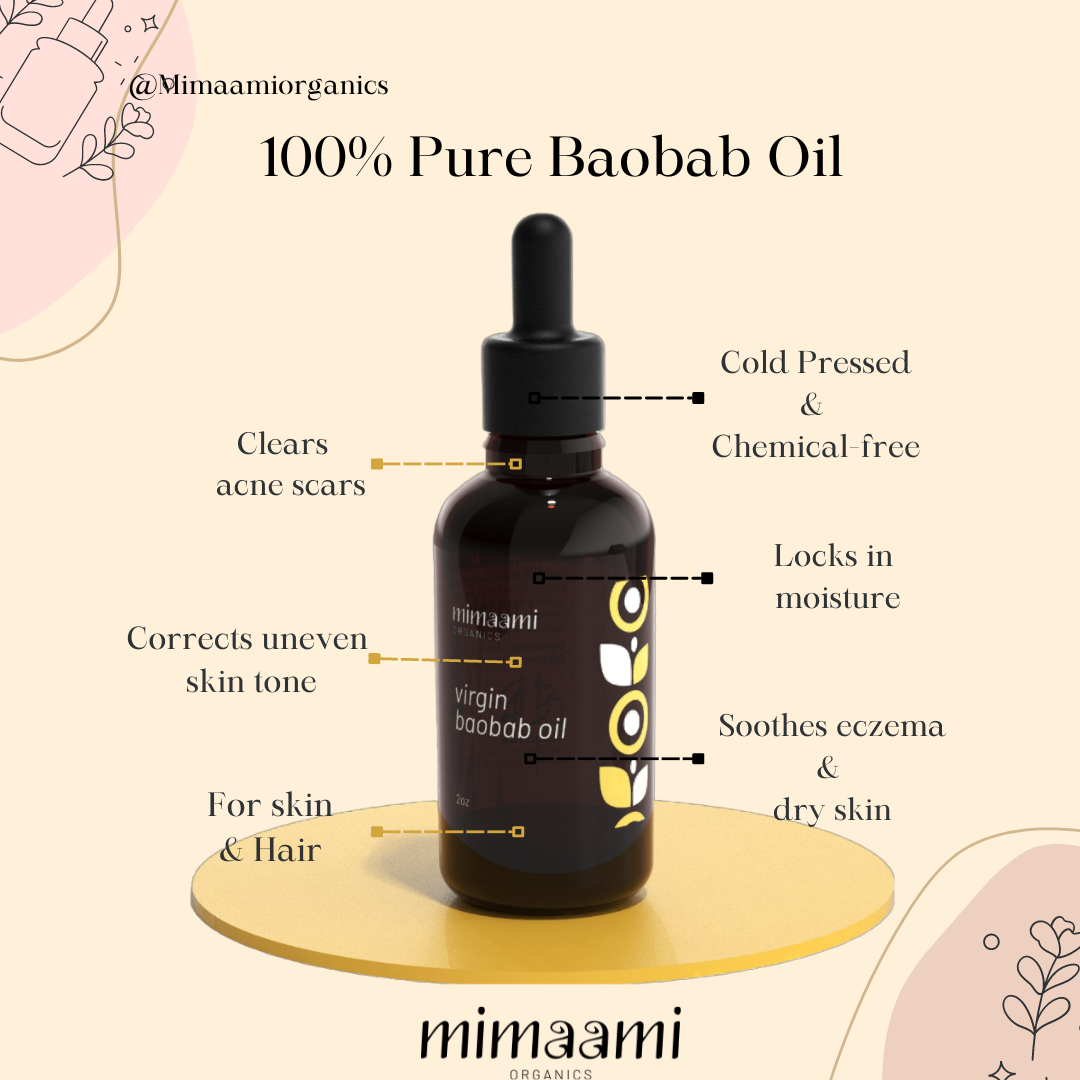The skin is an organ so it’s important to treat it with care and minimize exposure to harmful chemicals. Switching to natural products that are effective and improve the health and appearance of your skin can easily be done when you are aware of the ingredients in your skincare. Sticking to natural skin care products can treat many skin conditions and prevent the skin from aging. Baobab seed oil is one of the many miracle products that contains helpful antioxidants to repair, rejuvenate, and brighten the skin, and is used in a variety of cosmetic and skincare products.
Just like Mimaami’s Pure Marula Oil, Baobab seed oil is another cold-pressed oil. Pure organic Baobab oil is extracted from the seed that can be found in the fruit of the Baobab tree. By extracting the oil without heat, the nutritional value of the oil is kept intact without additives or chemicals. The tree is also known as “the tree of life” in Africa, but its scientific name is Adansonia digitata; Baobab seed oil is also known as Adansonia digitate oil or Adansonia oil.
Benefits of Baobab
Using pure Baobab seed oil in your skincare routine can reduce the appearance of wrinkles, soothe itchy or dry skin, correct uneven skin tone, and soothe skin conditions like eczema. It can also be used to moisturize the scalp and hair.
Aside from Baobab seed oil being very beneficial to the skin, studies have found that “the leaves, bark and fruit pulp have been traditionally used as immunostimulants, analgesics etc. in the treatment of diseases such as fever, diarrhea, cough, dysentery, haemoptysis, tuberculosis, microbial infection and worms.”1
Both, the baobab fruit, and seed oil have been used for centuries in African communities due to their benefits as a topical treatment and source of nutrition. The fruit is considered a super fruit because of the nutritional value it holds. A study in 2017 found that the “Baobab fruit pulp is low in protein and fat, but rich in pectins, calcium, minerals, vitamin B, and it contains seven to ten times higher content of vitamin C than oranges.”1 It has been eaten by locals for centuries and used to treat many diseases. The benefits of Baobab oil are unlimited making it a very popular oil in the health and cosmetic industry.

What Is Baobab Oil Used For?
Acne
Virgin Baobab oil is fast absorbing, non-irritating, and non-drying making it perfect for treating acne-prone or sensitive skin. It is also less likely to clog pores compared to other oils. The omega-6 fatty acids found in the oil make it anti-inflammatory, reducing pimples, blackheads, and acne from forming. It also contains high levels of linoleic acid which is great for oily and problematic skin because it balances the sebaceous gland function and prevents comedo-acne formation 2. Whether you have oily or dry skin, applying a layer of Baobab oil daily, after cleansing with our African Black Soap Face Wash, will clear whiteheads and blackheads, and reduce skin redness, irritation, and swelling to treat acne.
Eczema or dry skin
Another amazing benefit of organic Baobab oil is its ability to alleviate irritation from common skin conditions. Dry skin needs a lot of hydration and moisture. Unrefined Baobab oil is easily absorbed, possesses hydrating properties, has the ability to reduce water loss from the skin, and helps improve moisture retention 2. The fatty acids found in baobab seed oil promote a healthy skin barrier soothing skin conditions like eczema or dermatitis, psoriasis, and dry or itchy skin. It also prevents additional skin damage by protecting the skin from harsh weather leaving it smoother and softer. It is rich in vitamin C content which promotes collagen formation, boosting the skin’s radiance and natural elasticity.
Dandruff
Dandruff is a common scalp condition that can be difficult to treat and cure. Sometimes the weather or using a variety of hair products can irritate the scalp leaving it irritated and itchy triggering dandruff or seborrheic dermatitis. Baobab seed oil can be massaged onto the scalp after washing the hair to give it an extra layer of moisture and protection. Hydroxycinnamic acid glycoside is one of the natural components that give Baobab its antibacterial, antiviral, antifungal, and anti-inflammatory properties. Baobab oil “has been used to produce lubricants, soaps and toothpaste, in the topical treatment of various conditions such as muscle spasms, varicose veins and wounds and applied as a moisturiser for skin hydration, for hair and nail conditioning and to treat dandruff.”2
Hair & Eyelashes
In addition to treating scalp and skin conditions, organic Baobab oil makes a great moisturizer for dry and brittle hair because fatty acids like omega-3 that prevent water loss and seal in hydration. Applying a small amount to the ends of the hair can prevent the hair from splitting, breaking, and thinning. It can also be used as a hair mask, leave-in conditioner, or mixed in with other hair products.
Baobab seed oil can encourage the growth of longer and fuller eyelashes because it has been proven to soften and hydrate them. Applying a small amount on the eyelid and gently massaging into the eyelashes, will prevent the lashes from drying and falling/ breaking off leaving you with fuller and thicker lashes.
Every part of the baobab tree has been studied and tested for its benefits. It is a popular product in the beauty industry and is used in several supplements because of the nutritional and healing properties it holds. Incorporating Unrefined, Virgin Baobab seed oil in your skincare routine will give your skin the moisture and vitamins it needs to reproduce skin cells leaving you with smoother and glowing skin.
Bibliography
https://www.ncbi.nlm.nih.gov/pmc/articles/PMC5555379/#R15
https://www.sciencedirect.com/science/article/pii/S0102695X16300874?via%3Dihub

